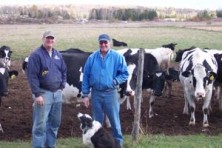Commentary: Door County Is Blessed with Broader, Better Agriculture
- Share
- Tweet
- Pin
- Share
Most people who knew me growing up have a hard time believing I was in an agricultural fraternity in college. But I was – the Iota chapter of Alpha Gamma Rho (AGR) at the University of Wisconsin-Madison, pledge #1434 to be exact.
Prior to joining AGR in September 2003, the extent of my farming experience (aside from owning a Garth Brooks CD or two) was working five summers in my grandpa’s massive one-acre garden where I was the proud teenage foreman of a sibling/cousin crew, tending a surprisingly efficient and successful multi-crop operation that fed our extended family and provided my mom and aunt with free daycare for my sister, cousin and me, as well as providing my grandmother with cheap entertainment for my grandpa.
But beyond knowing how to start and run the rotary tiller, having exceptional hoeing technique, the fiercest weed-removal determination this side of the Mississippi, and eventually learning how to drive a 1948 Ford tractor, I didn’t have a thorough understanding of modern farming practices.
It’s embarrassing to admit that prior to joining AGR I never really put much thought into for whom or for what all the crops along the rural Wisconsin highways were intended. I naively thought America’s appetite for soy and corn was pretty impressive, but bordering on gluttonous, not realizing 95 percent, or more, of the crops I had been driving past were actually meant to feed animals that would eventually feed us through their meat and/or milk products. Which is another way of saying I had plenty to learn about agriculture.
Joining AGR was a rash decision made mostly out of FOMO (“fear of missing out,” not to be confused with YOLO, a probable reason present-day college students might give for joining the Greek system) in my first two weeks on campus, but it’s one I have never regretted. The farm boy members of AGR kept the gorgeous lakefront house in immaculate shape and their genuine humility was refreshing after rushing traditional, multiple-polo-shirt-wearing, collar-popping, chest-bumping, beer-bonging bro fraternities.
As I learned during the initiation process, AGR’s stated purpose starts, “To make better men, and through them a broader and better agriculture.” I memorized the entire purpose as assigned after joining, recited it hundreds of times, but really didn’t reflect on its meaning until years later.
In addition to learning about ruminants, self-driving GPS-directed tractors, methane digesters, the moisture content of field corn and its relation to harvest time, the differentiating characteristics of an international award-winning Holstein vs. just another cow, the surprisingly robust global demand for (and sizeable job market supported by) prized frozen bull semen, and the difference between a heifer, steer, cow and bull, I made some of my best lifelong friends in AGR.
All college nostalgia aside, where is this going? Well, with all the rain we’ve been getting lately, I’ve had agriculture on my mind, from many different angles. Will submerged crops survive the June deluge? Looking at the stunted, brown corn stalks poking through standing water all over the southern part of the county, I’m not optimistic. What will that do to grain prices? To milk prices? To the price of my weekly box of Grape-Nuts? Or my weekly bag of Renard’s cheese curds? (A nutritionist told me last fall that, in moderation, cheese is a good source of protein and protein is good for you; hence, my cheese intake has, without exaggeration, quintupled since moving back to Wisconsin.) What about the wages and hours of farm workers, grain truck drivers, co-op employees, cheese makers, farm market employees, wastewater management engineers, and CSA proprietors? Will the lack of direct sunlight and overabundant moisture have a negative effect on our strawberries? What about our trademark cherries, of which Door County produces 8-12 million pounds a year?
I don’t have all the answers, but based on the questions, I feel some relief. Why? Because we have a broader and better agriculture here in Door County. To me, “broader and better” does not mean more fertile soil, more cows in the barn, or more acres under tillage. It means a diversified agriculture; a layered agriculture; a responsive agriculture; one in which certain risks are mitigated by the presence of multiple opportunities.
In addition to those agricultural opportunities listed above, Door County is a strong producer of eggs, wine grapes, apples, honey, maple syrup, and countless other delicious foods that find their way into our mouths and fuel our existence on this peninsula.
Conversely, there are towns and counties in the grain belt of our country in which just a few small families cash crop grain on tens of thousands of acres, making their livelihoods entirely dependent on the success or failure of just two crops: corn and soybeans. Those families are able to employ a minimal number of people for a minimal amount of time to get the job done, the only job being the growing and harvesting of those two crops, which is good for them, but limits the economic potential of their geographic area from a jobs, tax base and sustainability perspective.
By having a diversified and layered agriculture here in Door County, our farming economy provides more jobs, greater mobility and flexibility within the industry, greater purchasing power for those employed in the field (pun slightly intended), and protection from huge swings in grain prices and other factors mostly out of our control.
Not many days go by that I don’t gratefully reflect on all I learned from my fellow AGRs during my time at UW-Madison and the decade spent with those friends afterward. And as Mother Nature has her way with our landscape, human conflicts continue to intensify regarding modern agricultural practices, and my belly rumbles for lunch, I reflect on our good fortune in Door County to have a broader and better agriculture.



